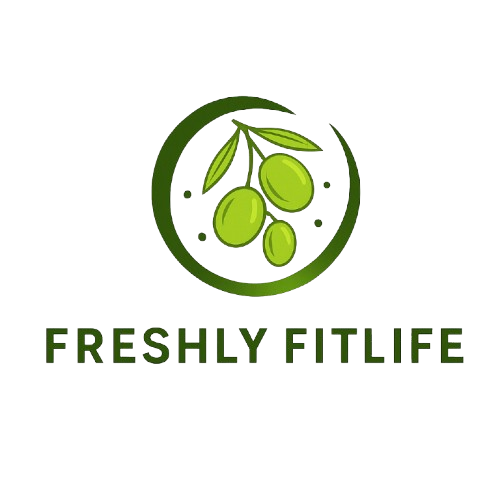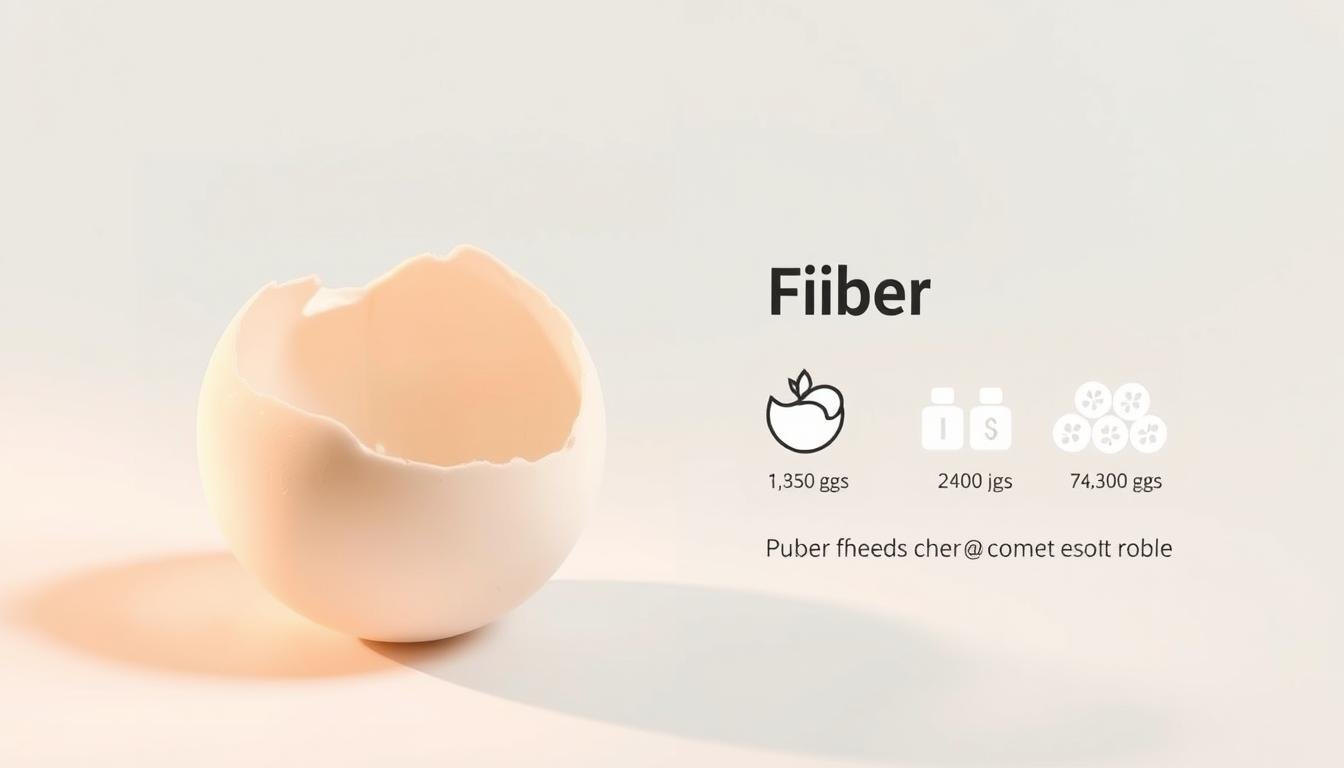Can a food with zero fiber still be a powerhouse for your health? Eggs often spark debates in nutrition circles, but one fact remains clear: they’re packed with nutrients that go beyond common expectations. Let’s crack into the details.
A single large, hard-boiled egg delivers 78 calories, 6.3 grams of protein, and 5.3 grams of fat. While they lack dietary fiber, their vitamin-rich profile—including B12, selenium, and choline—supports energy levels and brain function. Research even links moderate egg consumption to improved heart health and longer-lasting fullness.
This article isn’t just about fiber. We’ll explore how eggs contribute to balanced diets, their role in reducing heart disease risks, and creative ways to pair them with high-fiber foods. Ready to rethink your breakfast staple?
Key Takeaways
- Eggs contain no dietary fiber but are rich in protein, vitamins, and minerals.
- One large egg provides 6.3 grams of protein and essential nutrients like choline.
- Studies suggest eggs may support heart health and help manage hunger.
- Pairing eggs with fiber-rich foods creates balanced, satisfying meals.
- Upcoming sections cover recipes, dietary tips, and heart-health insights.
Eggs and Their Nutritional Profile
Eggs are nature’s multivitamin, offering more than meets the eye. A single large egg provides a dense mix of energy, building blocks for muscles, and nutrients that keep your body humming. Let’s break down what makes them a dietary powerhouse.
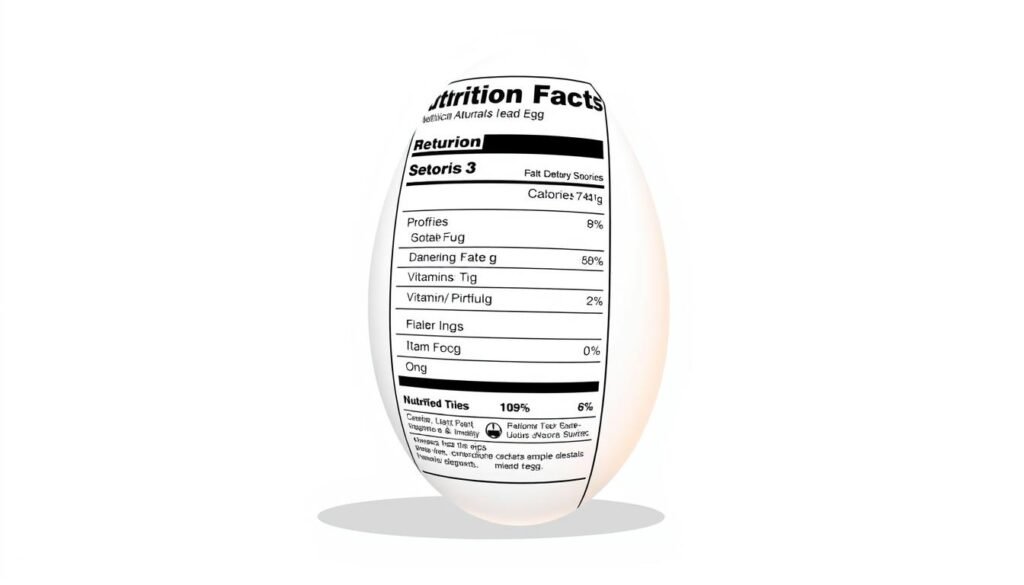
Caloric Content and Macronutrients
One large, hard-boiled egg clocks in at 78 calories, according to USDA data. Here’s where those calories come from:
| Nutrient | Amount | Role |
|---|---|---|
| Protein | 6.3g | Muscle repair & growth |
| Fat | 5.3g | Energy & nutrient absorption |
| Carbs | 0.6g | Quick fuel source |
The high-quality protein keeps you full, while the fat content helps your body absorb vitamins like A and D. Eggs contain almost no carbs, making them ideal for low-carb diets.
Key Vitamins and Minerals in Egg Nutrition
Egg yolks shine with nutrients. They deliver:
- Vitamin A (260 IU) – supports vision and immunity
- Vitamin D (44 IU) – boosts bone health
- Choline – vital for brain function
You’ll also get iron for oxygen transport and selenium for thyroid health. Recent studies show dietary cholesterol from eggs has minimal impact on blood cholesterol for most people. Pair them with fiber-rich foods like spinach for a balanced meal.
Exploring Egg Fiber Content: How Much Fiber is in Eggs?
Let’s set the record straight: eggs and fiber don’t mix. While they’re celebrated for their protein and vitamins, they contain 0 grams of dietary fiber. This often surprises people who assume all whole foods provide roughage. But here’s the twist—their nutritional strengths lie elsewhere.
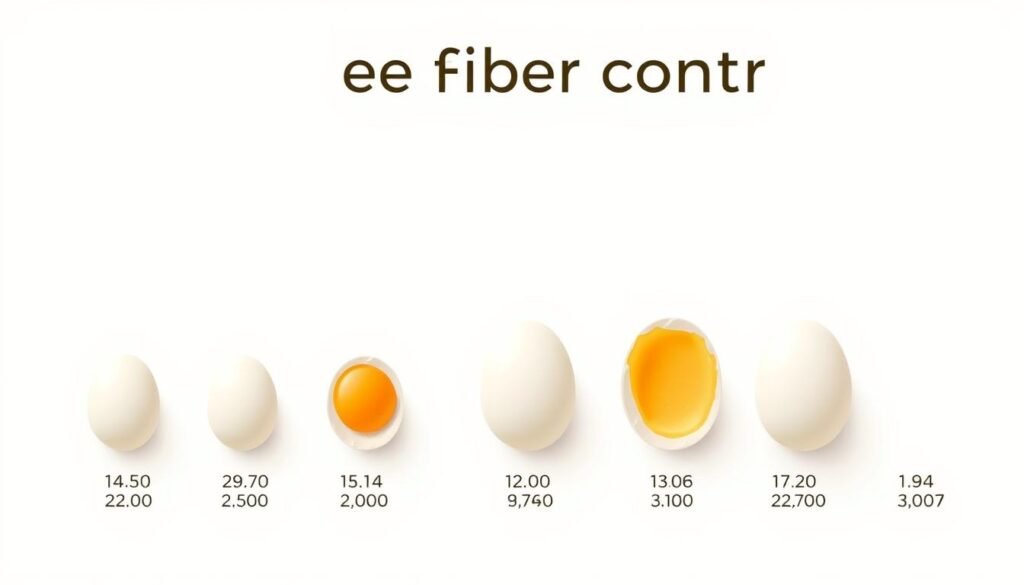
Fiber Myths and Facts in Egg Nutrition
One persistent myth claims eggs support digestion through fiber. Science confirms otherwise. What they lack in roughage, they make up for with:
- Choline – critical for brain health
- Vitamin B12 – supports energy production
- Selenium – boosts immunity
Pairing them with fiber-rich vegetables or whole grains creates balanced meals. Think spinach omelets or avocado toast with poached eggs.
Eggs vs. Fiber-Packed Alternatives
Compare a large egg to ½ cup of black beans:
- Eggs: 6g protein, 0g fiber
- Beans: 7g protein, 8g fiber
While beans deliver both protein and fiber, eggs provide higher amounts of certain nutrients like vitamin D. A varied diet incorporating both maximizes benefits. Research shows combining these foods helps regulate hunger and supports long-term health.
Eggs in a Balanced Diet: Benefits for Heart Health
Heart health debates often spotlight eggs, but science tells a surprising story. Research reveals their unique role in supporting cardiovascular wellness when consumed mindfully. Let’s explore how they fit into heart-smart eating plans.
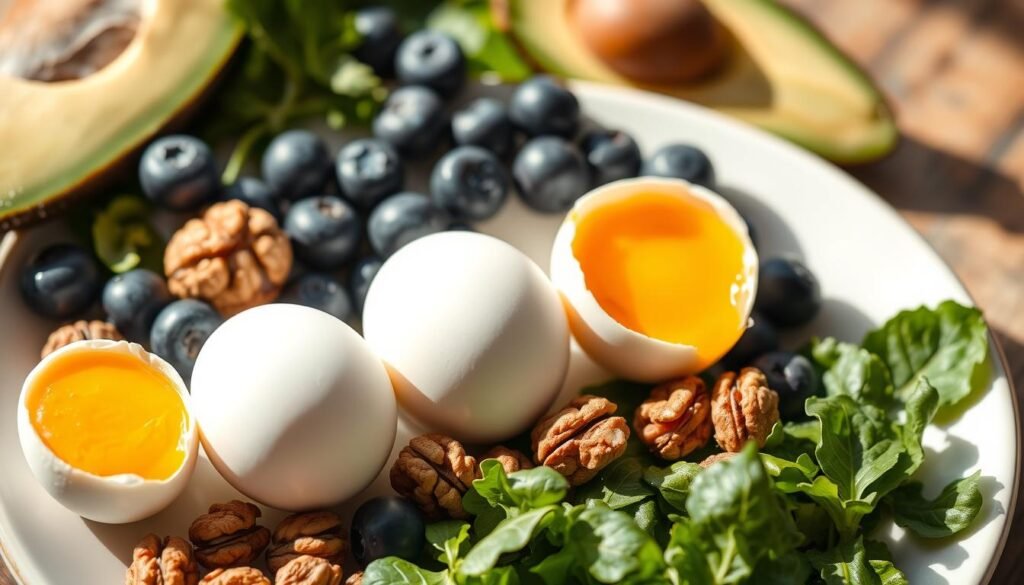
Cholesterol Insights and Dietary Guidelines
For years, eggs faced scrutiny due to cholesterol content. Updated FDA guidelines now confirm: most healthy adults can safely enjoy up to one egg daily. A 2021 review found no increased heart disease risk with moderate intake.
Key factors:
- Dietary cholesterol affects blood levels less than saturated fats
- Eggs provide HDL (“good” cholesterol) support
- 70% of people show minimal LDL response
Reducing Heart Disease Risk with Eggs
Eggs deliver four key nutrients that protect your heart:
| Nutrient | Role | Amount per Egg |
|---|---|---|
| Choline | Reduces inflammation | 147 mg |
| Vitamin D | Regulates blood pressure | 44 IU |
| Selenium | Prevents arterial plaque | 15.4 mcg |
| B Vitamins | Lowers homocysteine | 10-22% DV |
Studies link regular consumption to improved cholesterol profiles. Pair them with leafy greens or oats for maximum cardiovascular benefits.
Cooking Methods and Their Impact on Egg Nutrition
Your skillet choice could be changing more than just the taste of your breakfast. Cooking techniques influence nutrient retention and fat content in surprising ways. Let’s crack open the science behind preparation methods.
Scrambled vs. Hard-Boiled: Nutritional Differences
Heat changes eggs’ nutritional profile. USDA data reveals:
| Nutrient | Scrambled | Hard-Boiled | Impact |
|---|---|---|---|
| Protein | 6.1g | 6.3g | Minimal loss |
| Vitamin D | 38 IU | 44 IU | 13% reduction |
| Choline | 135mg | 147mg | 8% decrease |
Hard-boiling preserves more nutrients due to gentler cooking. Scrambling at high heat degrades heat-sensitive vitamins slightly.
Frying Techniques and Added Fats
Frying adds extra fats that alter the meal’s balance. One tablespoon of oil increases calories by 120 and saturated fats by 1.5g. Try these healthier swaps:
- Use non-stick pans with olive oil spray (0.5g fat vs. 14g in butter)
- Poach eggs instead of frying to eliminate added fats
- Pair fried eggs with avocado for healthy fats that support blood sugar management
Research shows cooking methods affecting cholesterol levels less than ingredient choices. Bake egg muffins with spinach instead of frying to maintain optimal nutrient levels.
The Protein and Nutrient Powerhouse: Eggs Benefits Beyond Fiber
Eggs pack a nutritional punch that goes far beyond common knowledge. While their lack of fiber might surprise some, their complete protein profile and unique fat composition make them a standout choice for health-conscious eaters.
Complete Protein Source for Muscle Repair
One large egg contains all nine essential amino acids your body can’t produce. This makes it a gold-standard protein source for muscle recovery. Research shows egg protein gets absorbed 30% faster than plant-based alternatives like beans.
| Protein Source | Complete Amino Acids? | Absorption Rate |
|---|---|---|
| Egg | Yes | 90% |
| Chicken Breast | Yes | 85% |
| Black Beans | No | 60% |
Omega-3s, Healthy Fats, and Other Nutrients
Eggs provide more than just muscle fuel. Pasture-raised varieties deliver omega-3 fatty acids shown to reduce inflammation. A 2022 study found people eating eggs daily had 20% higher blood levels of these heart-healthy fats compared to non-consumers.
Key nutrients in one large egg:
- Choline (147mg) – supports liver function
- Vitamin B12 (0.6mcg) – boosts energy
- Selenium (15mcg) – protects cells
Regular consumption links to better appetite control. Participants in a Nutrition Journal study reported feeling fuller for 3 hours longer after egg-based breakfasts versus cereal meals.
Debunking Egg Myths: Allergies and Cholesterol Concerns
Nutrition myths often crack under scientific scrutiny. While eggs face persistent rumors about health risks, modern research paints a clearer picture of their role in wellness. Let’s separate fact from fiction using current data.
Understanding Egg Allergies in Children and Adults
Only 2% of children under five show egg allergy symptoms, according to the American College of Allergy, Asthma & Immunology. Most outgrow it by age 16. Adults face even lower risks, with just 0.2% affected. For those with sensitivities:
- Cook eggs thoroughly to reduce allergenicity
- Consult allergists for personalized guidance
- Try egg substitutes like applesauce in baking
Dispelling Common Cholesterol Misconceptions
Decades-old fears about cholesterol content crumble under new evidence. The FDA’s 2023 guidelines confirm eggs don’t significantly raise blood cholesterol for 70% of people. Key factors:
| Nutrient | Impact | Comparison |
|---|---|---|
| Saturated Fat | 1.6g per egg | Lower than cheddar cheese (6g per ounce) |
| Dietary Cholesterol | 186mg | Has minimal effect on blood levels |
| Vitamin D | 44 IU | Supports calcium absorption |
Pairing eggs with vegetables creates meals rich in vitamins and minerals. Studies show their nutrient density supports cognitive function without compromising heart health when eaten in moderation.
Practical Ways to Incorporate Eggs into Your Diet
Transform your meals with eggs’ kitchen flexibility. Their neutral flavor and quick cooking time make them ideal for busy schedules while delivering essential nutrients. Let’s explore smart strategies to maximize their benefits throughout your day.
Creative Recipes for Every Meal
Start mornings strong with these nutrient-packed ideas:
| Meal | Recipe | Key Nutrients |
|---|---|---|
| Breakfast | Spinach & feta omelet | Choline, iron |
| Lunch | Avocado toast + poached yolk | Healthy fats, B12 |
| Dinner | Veggie fried rice with scrambled | Fiber, selenium |
Whip up egg muffins with diced peppers for grab-and-go snacks. Use leftover hard-boiled eggs in salads or grain bowls for extra protein.
Meal Planning Tips for a Balanced Diet
Pair eggs strategically to boost nutrition:
| Component | Pairing Idea | Benefits |
|---|---|---|
| Fiber Source | Whole-grain toast | Supports digestion |
| Vegetables | Sautéed kale | Adds antioxidants |
| Healthy Fats | Olive oil drizzle | Enhances absorption |
Batch-cook frittatas on Sundays for weekday lunches. Rotate preparation methods – bake, poach, or scramble – to keep meals exciting. Research shows people who plan egg-based meals save 23 minutes daily in kitchen prep.
For those monitoring cholesterol, use two whites plus one whole egg in recipes. This maintains protein content while reducing saturated fat intake. Daily consumption becomes effortless when you match eggs with seasonal produce and global flavors.
Conclusion
Eggs defy simple labels. While they contain zero dietary fiber, their nutritional value shines through high-quality protein, vitamins, and minerals. A single egg delivers 6.3g of complete protein alongside brain-boosting choline and immune-supporting selenium—nutrients many modern diets lack.
Recent research confirms that regular consumption doesn’t harm cholesterol levels for most people. Studies show pairing them with fiber-rich vegetables or whole grains enhances their benefits, creating meals that satisfy hunger and support heart health.
Their versatility makes eggs a kitchen staple. From quick scrambles to veggie-packed frittatas, they adapt to any meal while providing consistent quality. The USDA recognizes them as nutrient-dense foods worthy of balanced eating patterns.
Embrace eggs for what they offer: a compact source of essential nutrients. Whether boosting breakfasts or enriching dinners, their unique profile delivers value that goes far beyond fiber counts. Crack open new possibilities for nourishing, flavorful meals today.
